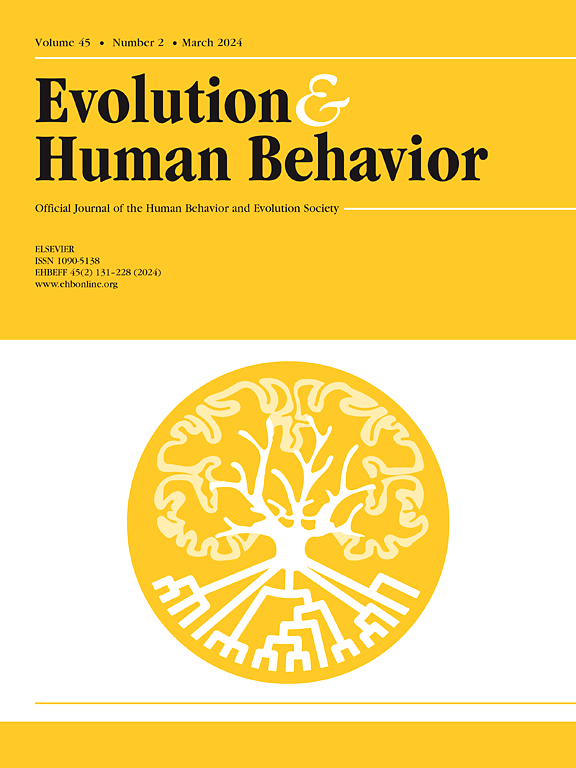An evolutionary perspective on homosexuality: Testing the sexually antagonistic genes hypothesis through familial fertility analysis
IF 3.2
1区 心理学
Q1 BEHAVIORAL SCIENCES
引用次数: 0
Abstract
There is robust evidence to the effect that homosexual individuals have systematically less offspring. The sexually antagonistic genes hypothesis claims that this fitness-related disadvantage of homosexual individuals is compensated by their other-sex relatives exhibiting greater fertility than the relatives of straight individuals. It would allow explain how genetic variants associated with homosexuality persist in the human population. Nevertheless, previous studies yielded conflicting results and, moreover, they focused almost solely on the fertility of gay men's relatives. We present the results of a large preregistered study based on data on fertility of both gay men's and lesbian women's relatives. We have analyzed the fertility and biological kin fertility of 693 gay men, 843 straight men, 265 lesbian women, and 331 straight women from Czechia and Slovakia. As expected, gay men and lesbian women sired significantly less offspring than straight individuals. However, we also found no evidence supporting the sexually antagonistic genes hypothesis, i.e., no difference between the fertility of other-sex relatives of homosexual and heterosexual individuals. Interestingly, though, paternal grandparents of gay men had more offspring than the paternal grandparents of straight men did. The mothers of lesbian women had a higher fertility than the mothers of straight women, but that could be attributed to intervening effects, such as the excess of older brothers in homosexual individuals. Our results suggest that mechanisms other than those predicted by the sexually antagonistic genes hypothesis are involved in the evolution of human homosexual orientation.
同性恋的进化视角:通过家族生育分析检验性对抗基因假说
有确凿的证据表明,同性恋者的后代会系统性地减少。性对抗基因假说认为同性恋个体的这种与健康相关的劣势被他们的异性亲属所补偿,他们的异性亲属比异性恋个体的亲属表现出更高的生育能力。这将有助于解释与同性恋相关的基因变异是如何在人群中持续存在的。然而,之前的研究得出了相互矛盾的结果,而且,他们几乎只关注同性恋男性亲属的生育能力。我们提出了一项大型预登记研究的结果,该研究基于男同性恋和女同性恋亲属的生育能力数据。我们分析了来自捷克和斯洛伐克的693名男同性恋者、843名异性恋者、265名女同性恋者和331名异性恋者的生育能力和生物亲属生育能力。不出所料,男同性恋和女同性恋的后代明显少于异性恋者。然而,我们也没有发现支持性对抗基因假说的证据,即同性恋和异性恋个体的其他性别亲属的生育能力没有差异。有趣的是,男同性恋者的祖父母比异性恋者的祖父母有更多的后代。女同性恋女性的母亲比异性恋女性的母亲生育能力更高,但这可能归因于干预效应,比如同性恋个体的哥哥过多。我们的研究结果表明,性拮抗基因假说所预测的机制之外的机制参与了人类同性恋取向的进化。
本文章由计算机程序翻译,如有差异,请以英文原文为准。
求助全文
约1分钟内获得全文
求助全文
来源期刊

Evolution and Human Behavior
生物-行为科学
CiteScore
8.30
自引率
9.80%
发文量
62
审稿时长
82 days
期刊介绍:
Evolution and Human Behavior is an interdisciplinary journal, presenting research reports and theory in which evolutionary perspectives are brought to bear on the study of human behavior. It is primarily a scientific journal, but submissions from scholars in the humanities are also encouraged. Papers reporting on theoretical and empirical work on other species will be welcome if their relevance to the human animal is apparent.
 求助内容:
求助内容: 应助结果提醒方式:
应助结果提醒方式:


